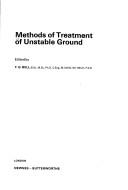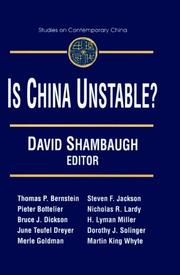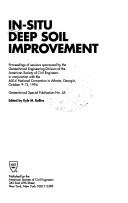| Listing 1 - 10 of 2595 | << page >> |
Sort by
|

ISBN: 0408001666 1322270694 148316327X 9780408001663 Year: 1975 Publisher: London : Butterworth,
Abstract | Keywords | Export | Availability | Bookmark
 Loading...
Loading...Choose an application
- Reference Manager
- EndNote
- RefWorks (Direct export to RefWorks)
Book
ISBN: 7504966339 1475598483 Year: 2013 Publisher: Washington, District of Colombia : International Monetary Fund,
Abstract | Keywords | Export | Availability | Bookmark
 Loading...
Loading...Choose an application
- Reference Manager
- EndNote
- RefWorks (Direct export to RefWorks)
The Global Financial Stability Report (GFSR) provides expert and up-to-date analysis of global capital flows that play a critical role in world economic growth and Financial stability. The report focuses on current conditions in global Financial markets, analyzing Financial imbalances and structural issues that could pose risks to stability and sustained market access by emerging market borrowers. Along with the IMF's semiannual World Economic Outlook, the GFSR is a key vehicle for communicating the IMF's multilateral surveillance. The GFSR also draws out the Financial ramifcations of economic imbalances highlighted by the WEO, making it an indispensable companion publication.
Book
ISBN: 9789264875685 9264875689 9264828044 Year: 2021 Publisher: Paris : OECD Publishing,
Abstract | Keywords | Export | Availability | Bookmark
 Loading...
Loading...Choose an application
- Reference Manager
- EndNote
- RefWorks (Direct export to RefWorks)
La pandémie de COVID-19 a causé d’immenses souffrances humaines et provoqué une grave récession au Brésil. Les pouvoirs publics ont réagi à la crise en adoptant rapidement et de manière décisive des mesures économiques pour venir en aide à des millions de Brésiliens. Néanmoins, pour asseoir une reprise forte après la récession, il faudra améliorer durablement les politiques économiques. Obtenir de meilleurs résultats budgétaires reste l’un des principaux enjeux de l’action publique compte tenu de l’ampleur de la dette du Brésil, qui a augmenté de manière considérable sous l’effet de la pandémie. Il faudra accroître l’efficience des dépenses publiques, notamment en s’appuyant sur les progrès accomplis antérieurement dans la lutte contre la corruption et la délinquance économique. La protection sociale peut être renforcée par un meilleur ciblage sur les politiques et les prestations les plus efficaces, ce qui pourrait entraîner une réduction marquée des inégalités et de la pauvreté. Une croissance plus vigoureuse permettra de voir progresser la productivité, quasiment stable depuis des décennies. Pour cela, il est nécessaire de s’employer à régler les problèmes sous-jacents qui se posent en matière d’action publique, notamment de réduire le poids de la réglementation, de réformer la fiscalité, de renforcer l’efficacité du système judiciaire et de favoriser une meilleure intégration à l'économie mondiale. Relever la productivité suppose des réaffectations et des mutations structurelles de l'économie, qui devront être accompagnées de politiques judicieusement conçues en matière de formation et d'éducation. Des programmes de formation mettant l’accent sur les demandes locales de compétences peuvent aider les travailleurs à maîtriser cette transition et à exploiter de nouvelles possibilités d’obtenir un emploi de meilleure qualité.
Book
Abstract | Keywords | Export | Availability | Bookmark
 Loading...
Loading...Choose an application
- Reference Manager
- EndNote
- RefWorks (Direct export to RefWorks)


ISBN: 0765605732 Year: 2000 Publisher: Armonk (N.Y.) : Sharpe,
Abstract | Keywords | Export | Availability | Bookmark
 Loading...
Loading...Choose an application
- Reference Manager
- EndNote
- RefWorks (Direct export to RefWorks)

ISBN: 078440058X Year: 1994 Publisher: New York (N.Y.) : ASCE,
Abstract | Keywords | Export | Availability | Bookmark
 Loading...
Loading...Choose an application
- Reference Manager
- EndNote
- RefWorks (Direct export to RefWorks)

ISBN: 9058093670 Year: 2002 Publisher: Lisse : Balkema,
Abstract | Keywords | Export | Availability | Bookmark
 Loading...
Loading...Choose an application
- Reference Manager
- EndNote
- RefWorks (Direct export to RefWorks)
Periodical
Year: 1996 Publisher: Paris : CCSF,
Abstract | Keywords | Export | Availability | Bookmark
 Loading...
Loading...Choose an application
- Reference Manager
- EndNote
- RefWorks (Direct export to RefWorks)
Book
Year: 2020 Publisher: Washington, District of Colombia : International Monetary Fund,
Abstract | Keywords | Export | Availability | Bookmark
 Loading...
Loading...Choose an application
- Reference Manager
- EndNote
- RefWorks (Direct export to RefWorks)
This paper focuses on Barbados' Third Review Under the Extended Arrangement, Requests for Augmentation of Access, and Modification of Performance Criteria. Barbados continues its strong implementation of the comprehensive Economic Recovery and Transformation plan aimed at restoring fiscal and debt sustainability and increasing reserves and growth. The ongoing global coronavirus pandemic poses a major challenge for the economy, which is heavily dependent on tourism, and is expected to have a large impact on the balance of payments and the fiscal accounts. State-owned enterprise (SOE) reform remains an essential element of Barbados' economic program. In order to secure fiscal space for investment in physical and human capital, transfers to SOEs need to decline after the global coronavirus pandemic with a combination of stronger oversight of SOEs, cost reduction, revenue enhancement, and mergers and divestment. Progress in restoring fiscal sustainability must be safeguarded by adopting a new central bank law that limits its financing of the Government to short-term advances and strengthens the central bank's mandate, autonomy, and decision-making structures. A strong recovery after the global pandemic will depend on accelerating structural reforms. There is much room for improvement in the business climate. Establishing a credit registry and credit collateral registry, in addition to broadening the types of eligible collateral, would facilitate access to credit.
Book
Year: 2022 Publisher: Washington, District of Colombia : International Monetary Fund,
Abstract | Keywords | Export | Availability | Bookmark
 Loading...
Loading...Choose an application
- Reference Manager
- EndNote
- RefWorks (Direct export to RefWorks)
During the COVID-19 pandemic and global financial crisis, governments swiftly served as financiers of last resort through large financial support measures (FSMs) such as loan and guarantee programs and equity injections in firms. This Staff Discussion Note argues that such FSMs prevented bankruptcies and attenuated the recession by increasing firms' liquidity, reducing risk premiums, and boosting confidence. But FSMs also carry large and long-lasting fiscal costs and risks. The note presents recommendations for managing the legacies of the COVID-19 programs and preparing for future crises. Ideally, FSMs should be assessed and included in budget plans, though a balance needs to be struck between speed and scrutiny.
| Listing 1 - 10 of 2595 | << page >> |
Sort by
|

 Search
Search Feedback
Feedback About UniCat
About UniCat  Help
Help News
News